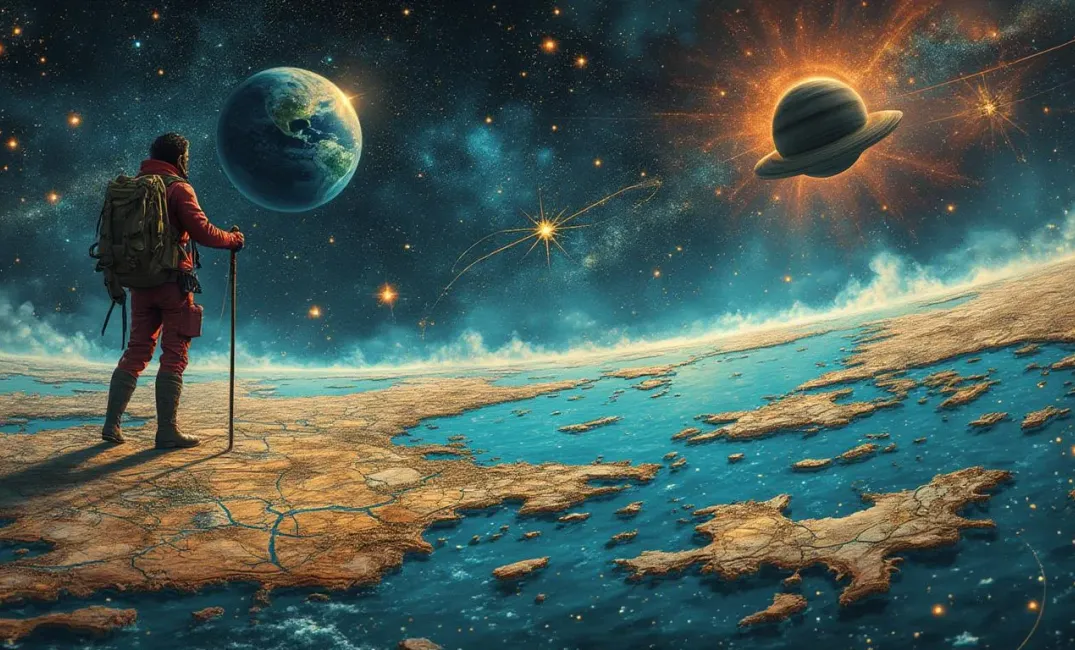Introduction: Humanity's Eternal Quest
"To explore strange new worlds, to seek out new life and new civilizations, to boldly go where no one has gone before." — Star Trek: The Original Series
Exploration is perhaps the most quintessentially human endeavor, embodying our innate curiosity, courage, and drive to uncover the unknown. From the vast stretches of uncharted oceans to the celestial mysteries of space, humanity has always yearned to expand its horizons and understand its surroundings. This impulse has led to groundbreaking discoveries and innovations, shaping cultures, economies, and civilizations across time.
As our solitary ark drifts through the cosmos, the legacy of exploration charts our potential and place in the universe. Today, we delve into the odyssey of human exploration, tracing its historic roots, transformative impacts, and future aspirations as we strive to write new chapters of exploration beyond the stars.
The Age of Discovery: Mapping Earth's Horizons
Early Navigators and Seafarers
- Polynesian Pursuits: Long before the advent of modern navigation, Polynesians mastered vast oceanic expanses using stars, ocean swells, and natural signs to navigate thousands of miles, weaving cultural connections across the Pacific.
- The Vikings: Norse explorers like Leif Erikson dared the Northern Atlantic, establishing settlements in Greenland and reaching the American continent, revealing maritime prowess and adventurous spirit.
The Renaissance Pathfinders
- Columbus and the New World: Christopher Columbus's voyages in 1492 opened the Americas to European exploration, catalyzing cultural exchanges and transforming global trade through the Columbian Exchange.
- Magellan and Circumnavigation: Ferdinand Magellan's expedition provided the first circumnavigation of the Earth, redefining geographic understanding and emphasizing exploration's role in bridging continental divides.
The Scientific Era: Enlightenment and Exploration
Advancements in Exploration Technology
- The Sextant and Chronometer: The sextant and John Harrison’s chronometer revolutionized navigation during the Age of Enlightenment, enabling precise longitudinal measurements and expanding maritime commerce.
- Cartographic Innovations: Improved mapmaking, aided by explorers like Captain James Cook, rendered the world more navigable, augmenting scientific insights into oceanography and continental boundaries.
Terrestrial Exploration and Continental Intrigue
- The Silk Road’s Revival: Though historical, renewed interest in Asian interiors through trade and exploration efforts rekindled geographical and cultural exploration, intertwining trade with scientific curiosity.
- Darwin’s Expeditions: Charles Darwin's voyage on the HMS Beagle unveiled natural wonders and ecological insights, sowing seeds of evolutionary theory and affirming exploration’s role in scientific paradigms.
Toward the Sky: Humanity's Quest for the Stars
Aviation Pioneers
- The Wright Brothers: The 1903 flight by Orville and Wilbur Wright marked humanity's ascent from surface-bound exploration to the sky, initiating the age of aviation and future cosmic aspirations.
- Amelia Earhart: As a pioneering aviator, Earhart’s endeavours transcended gender, inspiring generations to pursue exploration regardless of societal boundaries.
The Space Age: From Earth to the Moon
- Sputnik’s Echo: The Soviet Union's launch of Sputnik in 1957 heralded humanity’s entry into space, challenging geopolitical views and igniting the space race.
- Apollo's Legacy: The Apollo moon landings revealed extraterrestrial exploration capabilities, immortalizing human footsteps on the lunar surface and fostering cosmic imaginative landscapes.
The Future Frontiers: Interstellar Aspirations
Current Space Exploration
- Mars and Rover Missions: Mars Rovers like Curiosity and Perseverance symbolize human tenacity in planetary exploration, unearthing geological and potential biological mysteries on Mars.
- International Space Collaboration: The International Space Station (ISS) exemplifies multinational cooperation within space exploration, merging scientific inquiry with diplomatic dialogue, paving pathways for deep space missions.
Visions of Cosmic Colonization
- Astrobiology and the Search for Life: Beyond mere exploration, humanity seeks understanding of life itself, probing distant planets with telescopic and robotic technologies to uncover life-sustaining environments.
- Terraforming and Space Settlement: Concepts of terraforming and extraterrestrial settlements emerge as feasible, challenging technological imaginations and ethical deliberations—creative visions to bridge dream with reality.
Challenges and Ethical Considerations
- Sustainability in Space: As the horizon widens, ensuring space exploration aligns with sustainable practices becomes crucial, balancing resource usage and cosmic preservation.
- Cosmic Governance: Space exploration's expansion demands universal governance models, establishing principles for peaceful cooperation and ethically regulated cosmic pursuits.
Conclusion: A Forever Quest
"Exploration is really the essence of the human spirit." —Frank Borman
Human exploration is an eternal narrative—alive with challenges and potential, an ongoing odyssey imprinted within the fabric of our shared identity. The legacy of exploration has charted not only maps and stars, but the soul of humanity itself, embodying our dreams, intellect, and shared trajectory toward understanding the infinite.
As we drift deeper into the celestial unknown, we hold within this solitary vessel a transcendent legacy of exploration that represents both our past achievements and the limitless promise of our future. In these undertakings, each cosmic milestone is a tribute to the boundless spirit that propels us forward, seeking connection and meaning in the universe's vast emptiness—illuminated by the enduring light of human discovery.
TECHNOLOGY, HUMAN HISTORY, SCIENCE, EXPLORATION, CULTURAL EXCHANGE, NAVIGATION, SPACE EXPLORATION

